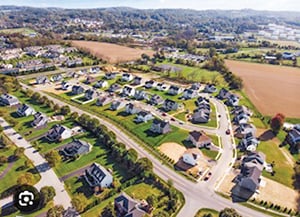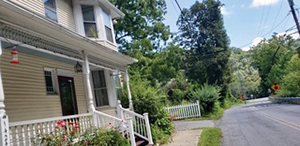
Standing on the scenic banks of the Delaware River in Easton, Pennsylvania, a pioneering Orthodox Jewish community is beginning to take root under the leadership of Rabbi Isaac Yagod. With a passion for nurturing small, out-of-town Jewish communities, Rabbi Yagod has spent the past year transforming a historic Victorian homestead into Beth Avraham, an Orthodox synagogue that welcomes everyone.
Rabbi Yagod’s sensitivity to the struggles of smaller Jewish communities was shaped by his own upbringing. When his family moved to Monsey, New York in the 1960s, the town was nothing like the bustling Orthodox area it is today. “Monsey was a different world then,” recalls Rabbi Yagod. “You couldn’t even buy kosher hard cheese there in those days.” His early experiences, as well as the guidance of prominent rabbis with whom he studied, instilled in him a deep commitment to building outlying Jewish communities.
Over the years, Rabbi Yagod’s journey has taken him to Montreal, Memphis and Portland, Maine, before settling in Pennsylvania in 2003. He served as the head of Allentown’s Vaad of Kashrut, revived a small congregation in Bethlehem, and became a respected rabbinical field representative in Pennsylvania as well as an expert in kosher certification agencies. In 2022, he took on a new challenge: building an Orthodox community from scratch in Easton.
The opportunity arose when a generous donor gifted a beautiful Victorian property on the bank of the Delaware River to be converted into a shul. As it is situated right off Route 611, congregants can enjoy views of the Delaware River and even New Jersey. Inside, Rabbi Yagod has created a warm, inclusive space for prayers, learning and connection. “When you come to our shul, you immediately feel like family,” he said. “You are not judged on your appearance, and every individual truly makes a difference.”
Starting with just three members, the community has been growing. A young baal teshuva couple joined and celebrated their wedding with sheva brachot that officially opened the Beth Avraham shul in June of 2024. Since Rosh Hashanah, regular services have been held there. Today, the shul frequently hosts a minyan and is continuing to attract new members.

Beth Avraham reflects Rabbi Yagod’s vision of inclusivity, welcoming both Ashkenazim and Sephardim, and catering to individuals of varying levels of Jewish knowledge and observance. It adheres to Orthodox standards with a mechitza and affiliation with the Orthodox Union (OU).
Beyond services, the shul offers vibrant programming, including winter Saturday night activities like painting and craft making, guest speakers, and engaging classes led by Rabbi Yagod. His popular Tuesday night Zoom shiur, “Lessons for the Modern World From the Weekly Torah Reading,” delves into contemporary halachic issues. Every Shabbat, the congregation shares a professional-quality lunch together in shul after services.
Rabbi Yagod explained that Easton is an appealing option in general. With affordable housing, low taxes and its proximity to Allentown and New Jersey, it’s now becoming a viable location for Orthodox families. Luxury homes with river views are being sold for approximately $400,000, and local stores like Wegmans and ShopRite are expanding their kosher offerings. Nearby Allentown provides access to Jewish day schools, mikvahs and additional kosher shopping.
“Living in Easton today feels a bit like stepping into Monsey circa 1965,” said the rabbi. “Back then, Monsey was just beginning to attract families looking for a quieter, more natural way of life. The infrastructure was minimal, and the journey to get there—especially before the Tappan Zee Bridge—was no small feat. Yet, people made the trek. They were drawn by the peaceful environment, a respite from the hustle and bustle of city life, and a chance to raise their children closer to nature. For many people, the long drive was a small price to pay for the lifestyle provided.”
Transportation challenges in those early days only added to the adventure. There were no direct buses like the modern Monsey shuttles of today. Travelers relied on coach lines from midtown Manhattan to Spring Valley, followed by a search for a ride to their final destination. What took hours and patience back then is worlds apart from the convenience of today’s transit options. Similarly, Easton has an array of bus connections to New York City, making it an accessible choice for commuters. But with Lehigh Valley emerging as a major employment hub, the need to commute is decreasing.
Rabbi Yagod shared that the Lehigh Valley region enjoys a rare natural stability, free from the hurricanes, tornadoes and earthquakes that plague other parts of the country. Its low crime rates add to its tranquil atmosphere.
Unlike some Jewish neighborhoods that have struggled to accommodate rapid population growth, the Lehigh Valley stands out for its robust infrastructure. In older communities, narrow streets, overwhelmed utilities and outdated building codes can make expansion challenging. Easton, on the other hand, benefits from the region’s “over-engineering.” Wide roads, sturdy electrical systems and meticulous building codes ensure the area is ready for development.
Partly due to the Amish community’s influence, the state is particularly supportive of home education. Pennsylvania’s resources to aid in home schooling—such as providing math and science programs—are much more accommodating than the stricter regulations in New York and New Jersey.
As the easternmost part of the Lehigh Valley, Easton is becoming a new possible destination for Orthodox families to enjoy a balanced lifestyle and a better life in the suburbs.
For more information, contact Rabbi Isaac Yagod at: rabbiyagod1@gmail.com.








